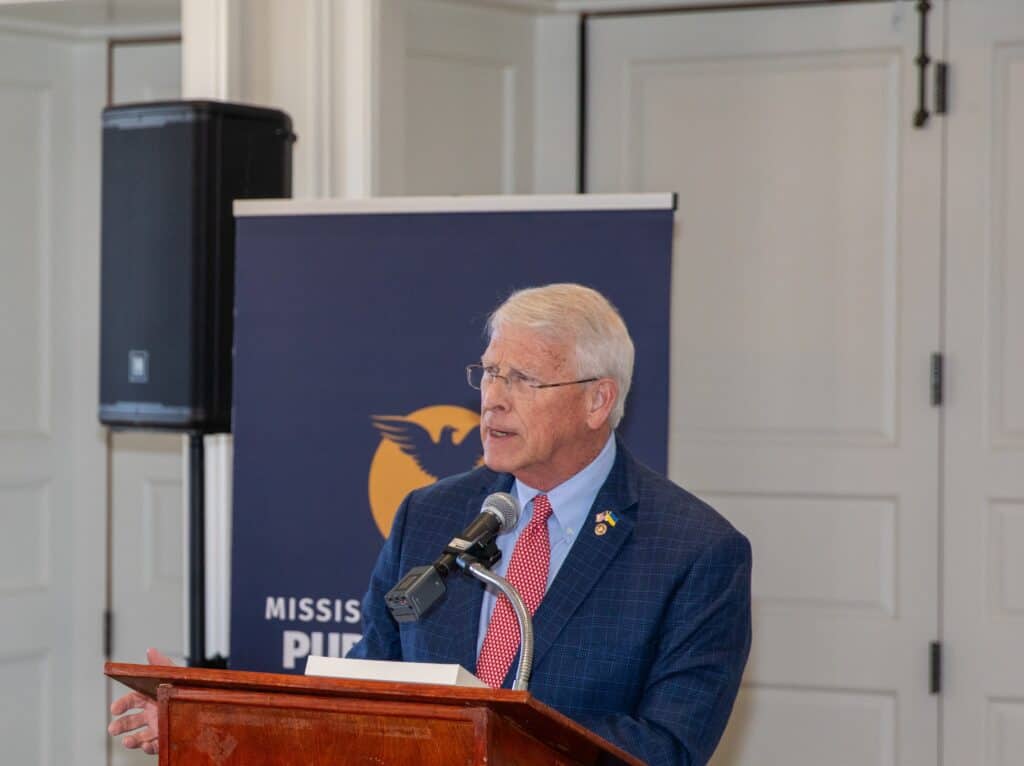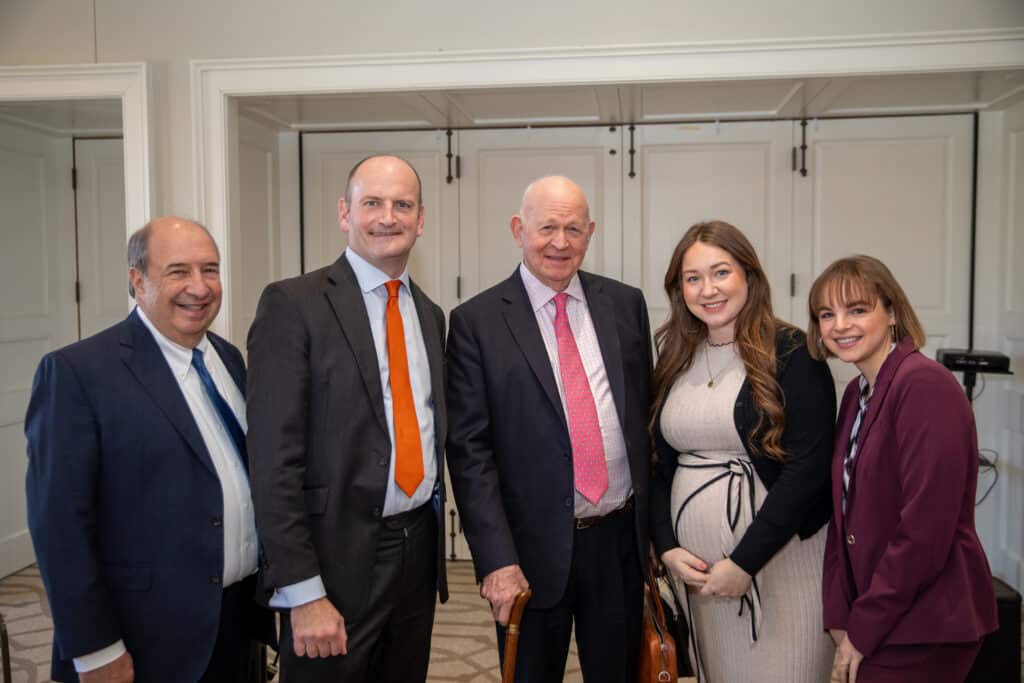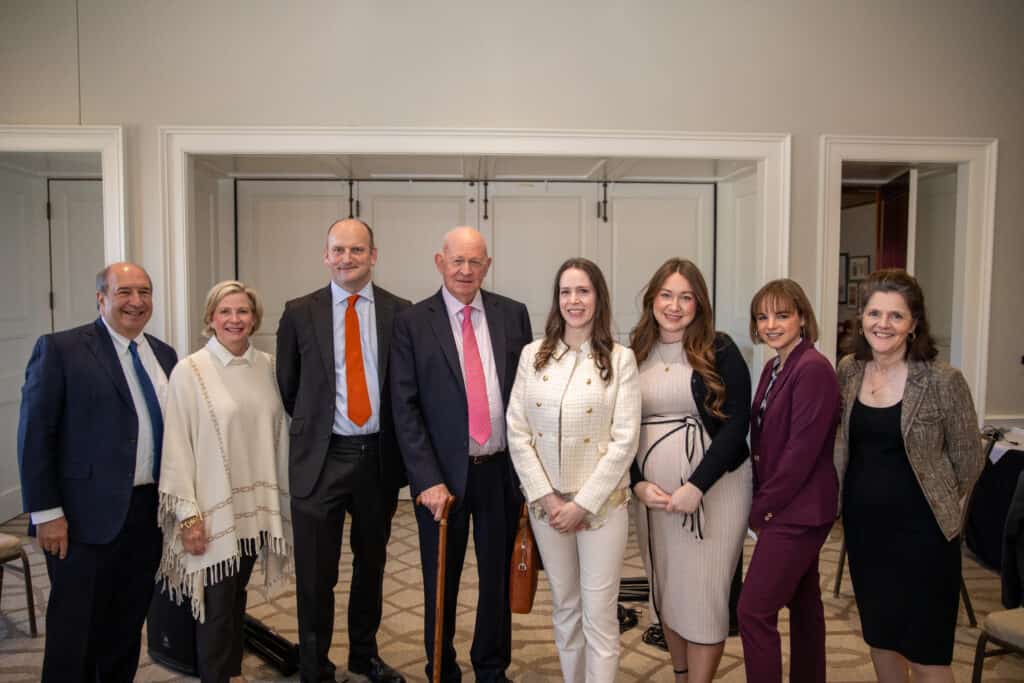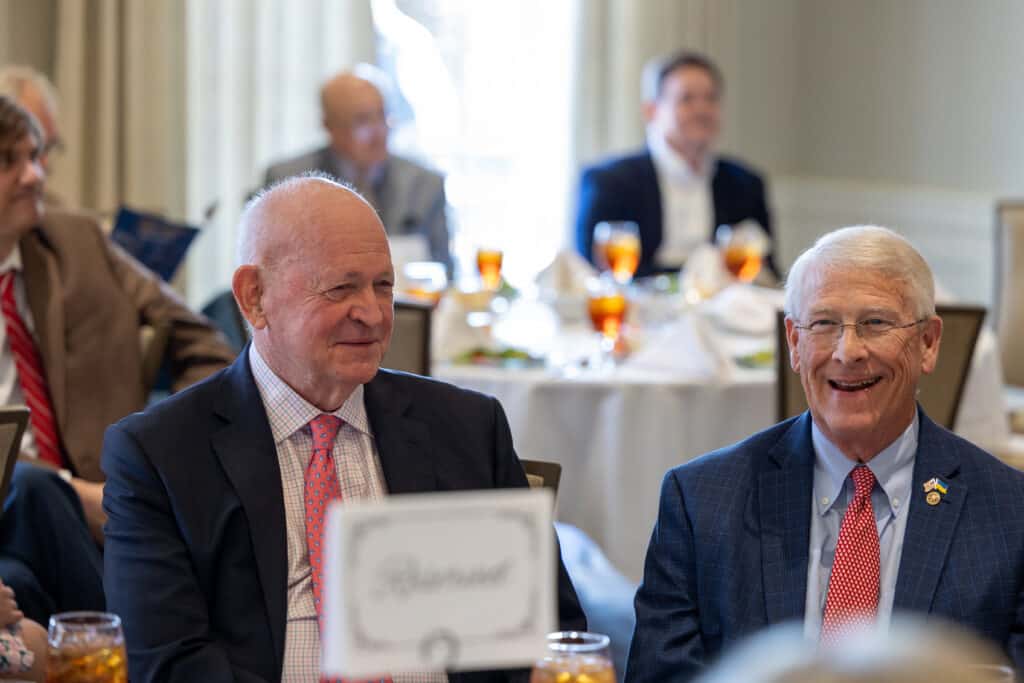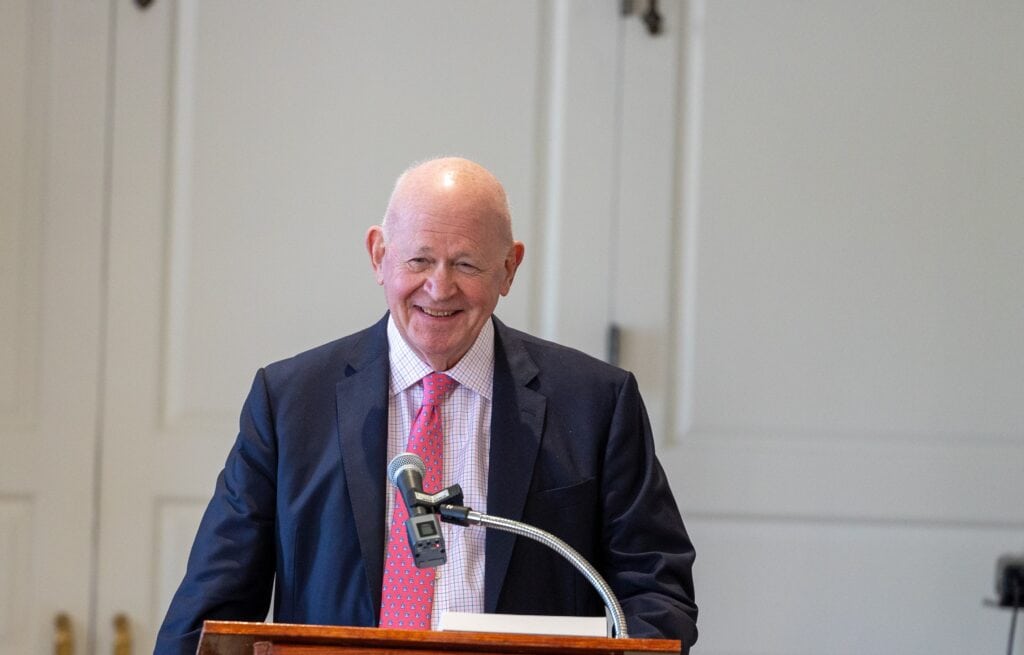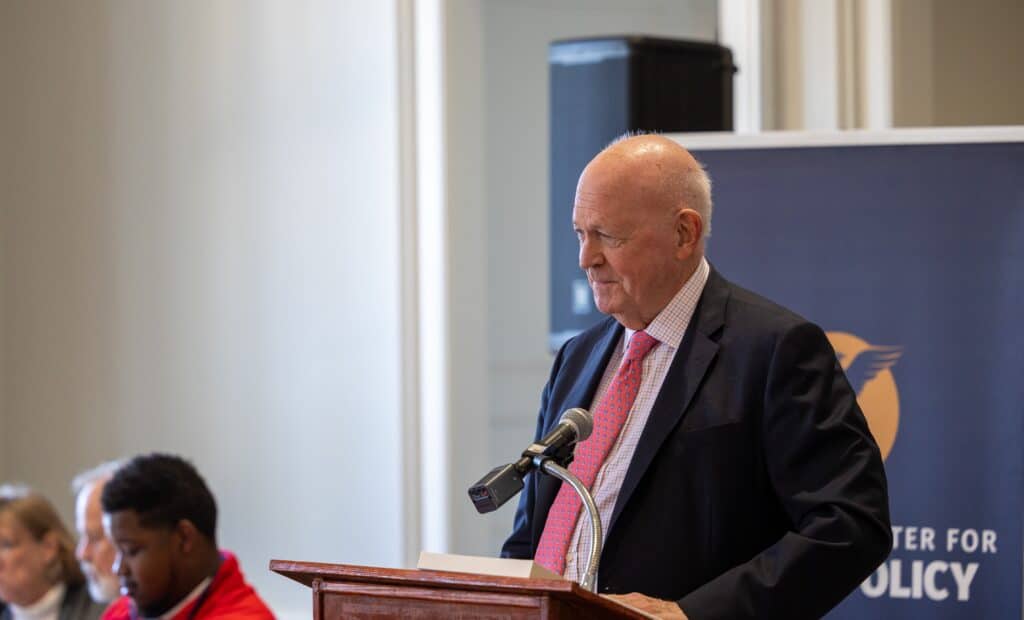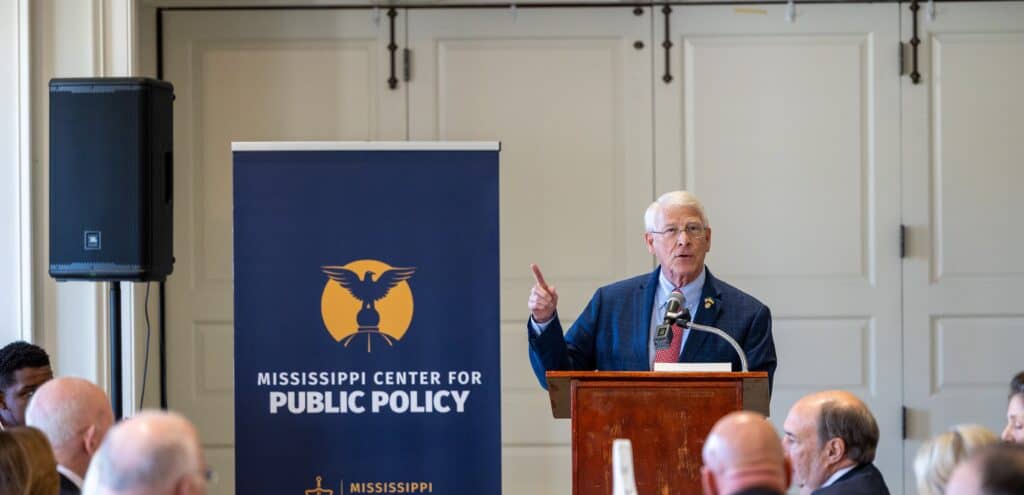The Mississippi Center for Public Policy teamed up with the Heritage Foundation to host a packed lunch with Senator Roger Wicker and leading foreign policy strategist, Michael Pillsbury.
Drawing from his bestselling book about China, “The Hundred Year Marathon”, Michael Pillsbury explained just how easy it is for China to gain access to top-secret American defense plans.
Pillsbury explained how under President Nixon and Henry Kissinger, America initially took a pro-China approach, seeking to engage and assist what was then the world’s most populous country.
China, Pillsbury suggested, has learned our strategy all too well and is able to take advantage of it. Even today, America’s administrative state continues to assist China is ways that are not always in America’s best interest.
Pillsbury went on to suggest that America should adopt a Reagan-era approach of achieving peace through strength, building up our military capability in the hope that we never need to use it.
China, some believe, has made plans to invade Taiwan within the next few years. America needs to prepare for every eventuality.
Wicker went on to emphasize the importance of the US navy and the need to ensure the navy had sufficient strength and capabilities.
Taiwan, both Wicker and Pillsbury agreed, should be strengthened in a way that resembles the defense of a porcupine. While not a proactive threat to anyone, a porcupine’s needles ensure than anything that attacks it risks incurring serious pain. Taiwan, they suggested, can be strengthened to a point where China would reconsider making any move on the island state.
Not enough people in Mississippi work. Out of every 100 working age adults in our state, 46 are not in the labor force.
Nearly half of working age Mississippians are not in formal employment – and they aren’t actively looking for employment either.
At the same time, there are a record number of jobs available. According to the US Bureau of Labor Statistics, in October last year there were 80,000 unfilled jobs across the state.
Not only are there lots of jobs available in Mississippi, but according to new research a record number of people are now moving to Mississippi to take up those opportunities. 2022 saw a net inflow of 12,000 (often young) people to our state, coming largely from Tennessee, Louisiana, Alabama, Texas and Florida.
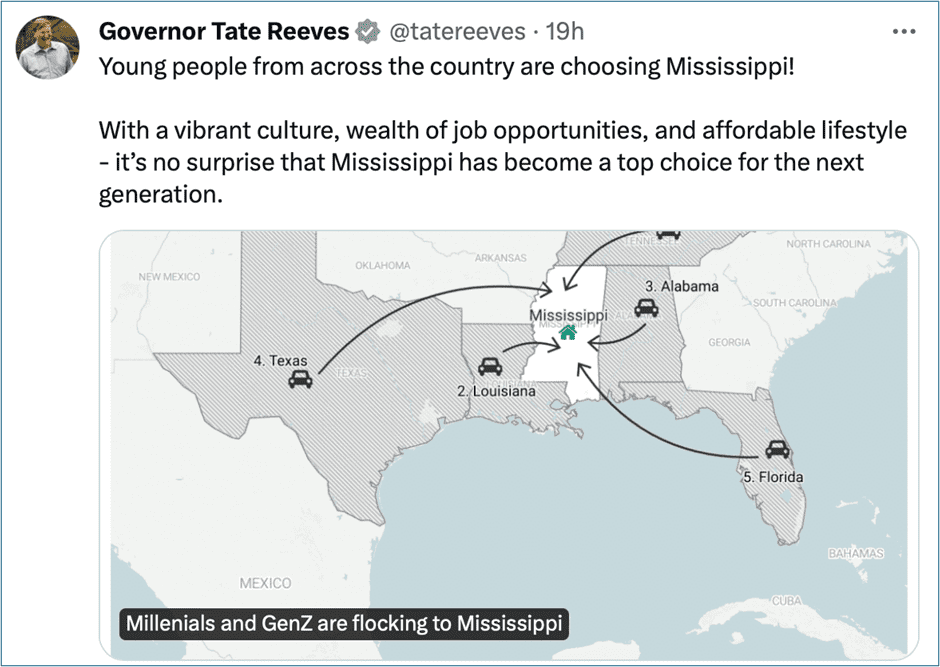
A combination of labor market deregulation, inward investment and tax cuts seems to be transforming Mississippi for the better. Our state is no longer a place that people leave, but somewhere people move to in search of new opportunities. What can we do to ensure that more people in Mississippi take full advantage of those job opportunities?
It is not enough to merely talk about opportunities. With 80,000 job vacancies right here, right now, there are opportunities to work all around us. The issue is why some folk aren’t taking the opportunities that are there.
Some have suggested that we hire more career counsellors in high schools. I am certain that career counsellors do a wonderful job, but if that is the only policy solution, I suspect labor force participation will remain low.
If we are going to increase workforce participation, we need to ask difficult questions about welfare. Does welfare create disincentives against work?
Mississippi has a population of 2.95 million. Approximately one in five (19 percent) live below the poverty line (calculated as the minimum income needed to get by with the bare essentials.)
The way in which the myriad of assistance programs impacts the half a million plus people below the poverty line matters, and needs to be properly understood if we are to improve workforce participation.
Welfare programs can have unintended consequences, and one of them is the creation of so-called ‘benefit cliffs’. A benefit cliff is what happens when someone loses benefits if their income increases, but the benefits they lose outweigh the additional income gained.
Given the maximum income thresholds allowed, we know, for example, that if someone’s monthly income went from $400 a month to $410 a month, they would no longer qualify for some Temporary Assistance programs.
If your income rose above $1,215 a month, you could lose the right to claim Supplemental Nutrition Assistance Program (SNAP). When your income per person goes over $19,392 a year, you may no longer qualify for Medicaid (although the ‘cliff’ cut-off is not always as abrupt as is sometimes supposed).
Take into account the different benefit cliffs, and you could have a powerful range of disincentives.
Even if a person was notionally better off when holding down a 35 hour week job, the time and effort it would take for a relatively modest increase in income might leave some feeling having a job was not worth it.
It has been suggested that benefits do not create a problem of ‘cliffs’, but of straight forward dependency. They point out, for example, that those on food stamps are not those hovering on the edge of the labor market, but full-time welfare dependents. There may be some truth in that, too.
So, what is the solution?
The answer to benefit ‘cliffs’ is not to increase welfare payments in order to remove disincentives, but to institute more stringent work requirements for those on welfare programs.
In Arkansas under Sarah Huckabee Sanders, anyone that fails to accept a suitable job within five days of being offered one, or who fails to show up for job interviews without notice, can now lose their benefits.
If we are serious about increasing workforce participation, we may well need to implement something similar.
Today is officially Ronald Reagan Day in Mississippi!
Governor Tate Reeves has signed a proclamation making February 6th, the date on which the 40th President was born, Ronald Reagan Day.
“Ronald Reagan was born on this day in 1911,” said Douglas Carswell, President & CEO of the Mississippi. “I believe he was one of the greatest leaders America has ever had. He defeated Soviet communism, revived an ailing economy and renewed America.”
“America needs another Ronald Reagan and his sense of optimism”
Thirty three years ago, the Soviet Union fell apart. A Marxist-Leninist system that had stood in competition with the Western way of life for half a century was no more.
Unfortunately, in that moment of triumph, Western leaders made a grave error; they started to believe that there had been an inevitability about Western success.
If the Soviet Union had ditched communism in favor of free markets, everyone else would become more Western, too, right? Wrong – and nowhere more so than with regard to China.
At the turn of the century, when China was welcomed into the World Trade Organization, all the clever people at the State Department assumed it was only a matter of time before China’s emerging middle class would make the country more like us.
Under Deng Xiaoping and immediately after, China had permitted private enterprise, and the country’s communist rulers had imposed limits on their power. China’s provinces enjoyed a high degree of autonomy, with Hong Kong even having her own legal system, currency and democracy.
Deng’s leadership, we can now see, did not represent a new direction for China, but a brief interlude. Under Xi, China has reverted to the Ming tradition; authoritarian government, overzealous control, the targeting of anyone independently wealthy.
Rather than becoming part of the international system, China seems to be a threat to it. Democracy has been crushed in Hong Kong. Military bases have been built in the south China sea. Taiwan is at risk of invasion.
If China is behaving like she is in competition with the Western way it is because she is. We need to recognize this and act accordingly.
Just as there was never anything inevitable about the success of the West, nor is there anything inevitable now about the rise of China.
In fact, China faces serious demographic decline. Ruled by an innovation-sapping authoritarian regime, China may not be destined for global hegemony the way we have been told. But that may not make the Chinese government any easier to deal with.
At the same time, rather than becoming more Western, many parts of the world besides China – such as Turkey, Pakistan or Egypt - seem less Western than they were.
The West itself is becoming less Western, with Europe undergoing dramatic demographic change. Having prevailed against a Marxist-Leninist system in Russia, Western leaders allowed a Marxist-Identitarian system to incubate in our universities. Many US universities no longer teach Western Classics and have in effect abandoned the European Enlightenment.
The West needs leaders willing to set aside post-Cold War assumptions. Rather than presume Western success, we need leaders who recognize that it is tough and difficult to stand up for Western interests – but also essential.
Above all, we need leaders that appreciate that Western culture is the product of ideas and insights that did not arise in a vacuum. The Western way needs safeguarding not just aboard, but on college campuses here in the United States, too.
Often in politics, it is easier to define a problem than it is to solve it.
Remember Barack Obama’s eloquent speech about the need to unite America beyond red states Vs blue states? When Obama left office, America was more politically polarized than before.
Who could forget Al Gore’s theatrics as he talked about the need to save the planet? I doubt a Gore-run administration would be able to control the country’s borders, let alone control global sea levels or the climate.
Remember how during last year’s gubernatorial race here in Mississippi, Brandon Presley, the Democrat candidate, waxed lyrically about the fate of rural hospitals? Hosing federal funds around is unlikely to change the fact that hospitals that are underused will remain underused.
Politicians can certainly make problems worse. Obama, I would argue, exacerbated America’s divisions. Gore & co have advocated for an energy policy that does nothing to control the climate, but has made people poorer. Subsidising an underused health service is unlikely to make it magically sustainable.
Occasionally, however, politicians have it in their gift to do something that really would improve things.
In a report we published this week, we show that there is a solution to Mississippi’s healthcare crisis staring us in the face: our leaders could abolish the anticompetitive laws that intentionally limit the number of healthcare providers in our state. This would improve access to healthcare and lower costs for everyone.
For years, if a healthcare provider wants to offer new services or expand existing services in 19 key areas of health care, they are required by law to get a permit. These Soviet-style permits, known as Certificates of Need (CON), are also required for a provider wanting to spend more than $1.5 million on new medical equipment, relocate services from one part of the state to another, or change ownership.
Unlike other sensible licensing requirements, CON requirements are not designed primarily to assess a provider’s qualifications, safety record, or fitness. They are about central planning to decide if each new applicant’s services are “needed” by the community. I believe that it should be up to patients and practioners to decide what is needed, not government bureaucrats.
CON laws in Mississippi limit the provision of long term care, despite demographic change that has seen the number of elderly people needing care increase dramatically. Ambulatory services, key diagnostic services, psychiatric services and many other services are all limited by CON laws.
If the case for change is so overwhelming, why has it not already been done? In any market, when there are restrictions imposed to keep out the competition, there will be various vested interests that lobby for their retention. So, too, with CON laws.
Defenders of CON restrictions suggest that CON repeal would be risky and dangerous. They like to imply that any reform would reduce access and quality would suffer.
Such concerns are unfounded. Over 100 million Americans—nearly a third of the population—live in states without CON laws in health care. Four in ten Americans live in states with limited CON regimes that apply to only one or two services, such as ambulance services or nursing homes.
If our lawmakers are serious about improving healthcare in Mississippi, I hope they read our report, which sets out not only what needs to be done, but provides a roadmap explaining how to do it.
High flying rhetoric won’t improve our state. Getting down to work and removing CON laws will.
Report identifies key reforms needed to boost health outcomes in Magnolia state
Removing outdated restrictions on health care would boost health care in Mississippi, according to a new report published today. Mississippi has some of the worst health outcomes in the country, and the full repeal of these anticompetitive laws in the health sector would cut costs and improve access to treatment.
For several decades, an official permit has been required for health care providers wanting to offer new services or expand existing services in 19 key areas of health care. These permits, known as Certificates of Need (CON), are also required for a provider wanting to spend more than $1.5 million on new medical equipment, relocate services from one part of the state to another, or change ownership.
Unlike other health care licensing laws already in place, the CON process is not designed primarily to assess a provider’s qualifications, safety record, or fitness. Instead, CON laws require regulators to centrally plan the health care sector by assessing whether each new applicant’s services are “needed” by the community. That question, however, can only be truly answered through the voluntary choices of practitioners and patients.
“If you want to know why Mississippi does not have medical care where it is most needed, CON laws bear much of the blame. They intentionally take away options for health care,” explained Douglas Carswell, President and CEO of the Mississippi Center for Public Policy.
“What started out a generation ago as a misguided attempt to restrict increases in health costs has become a legally-sanctioned protectionist scheme. These outdated laws are indefensible and must go.”
CON laws in Mississippi limit the provision of long term care, despite demographic change that has seen the number of elderly people needing care increase dramatically. Ambulatory services, key diagnostic services, psychiatric services and many other services are all limited by CON laws.
The report, authored by Matthew Mitchell, one of America’s leading experts on health care regulation, references overwhelming evidence which shows that CON laws mean higher spending, less access, and diminished quality of care.
Mitchell’s report identifies a road map for reform, highlighting how full abolition could be achieved. “The evidence from other states without CON laws not only shows how a Mississippi without CON would enjoy greater access to lower cost and higher quality care, but it also gives us a roadmap for how to do it. In the report, I talk about 11 different strategies for reform,” said Mitchell.
“The Governor and the new Speaker have both committed to improving health outcomes in Mississippi by repealing restrictive practices. We are excited to see legislation aimed at CON repeal, as well as action by the Board of Health to remove the red tape,” added Carswell.
Last year, Mississippi Republicans won an overwhelming majority. Could 2024 be the year when they use that majority to deliver the kind of big, strategic change our state desperately needs?
Here are a number of reforms that Mississippi conservatives have it in their gift to implement, which would transform the long term prospects of our state for the better.
- Education Freedom:
2024 could be the year that we give every family in the state control over their child’s share of education tax dollars, through an Education Freedom Account. Arkansas passed legislation to do precisely that last year. Tennessee and Louisiana are poised to do something similar. Rather than trailing behind, Mississippi lawmakers should take the lead, delivering big, strategic change to improve education in this state, too.
The Mississippi Center for Public Policy recently held a public rally for education freedom, with Corey DeAngelis and local educators, helping mainstream the idea. Recent polls now show overwhelming public support.
- Affordable healthcare:
Too many families in Mississippi cannot get health coverage. Rather than hosing federal dollars at the problem, we need to look at what states like Florida are doing to innovate, with alternatives to insurance-based healthcare. This means ending the restrictive Certificate of Need laws that prevent new low cost health care providers from operating. It also means allowing nurse practitioners more autonomy. The Mississippi Center for Public Policy will soon publish a roadmap on how to go about removing CON laws.
- Tax cuts:
In 2023 Mississippi had a large state budget surplus. Rather than wait for politicians to think up new ways to spend that surplus, we need to see tax cuts in 2024. One option would be a further reduction in the state income tax.
Our neighboring states are reducing the tax burden on families and businesses. If we want to reverse the population decline in our state, we need to do so too.
- Abolish DEI (Diversity, Equity & Inclusion):
In recent months we have seem appalling behaviour by ‘woke’ academics at several leading universities. It is now clear that DEI is destroying American academia. So why are public universities in Mississippi still running DEI programs? The Governor of Oklahoma recently issued an order terminating funding for DEI programs in public universities in that state. Mississippi needs to stop the rot in public universities and end DEI programs in 2024.
While those are our top four priorities for 2024, here are some other things we would like to see our law makers deliver:
- Women’s Bill of Rights / Parents Bill of Rights: Early last year, we invited Riley Gaines to speak in Jackson as part of our campaign to mainstream the idea of protecting women’s rights. We are thrilled to see so many people come out in support of the idea of building on the safeguards already contained within the Mississippi Fairness Act.
- PERS reform: The laws of math make the current public employee retirement scheme (PERS) unsustainable. Mississippi needs reforms so that young people starting work in the public sector have defined contribution, rather than defined benefit, pensions. Unless we make this change now, our grandchildren will end up with a massive tax bill. 2024 is the year when we need to see sensible changes made to PERS.
- Ballot initiative: Citizens in our state used to have a right of ballot initiative. Over a thirty year period, almost 70 initiative attempts to change the state constitution were made, with only three being successful. A failure to update the rules for triggering such initiatives means that we no longer have this right in practice. MCPP would like to see the right of ballot initiative restored, allowing citizens to change state law.
- Young Enterprise Act: Mississippi ought to do more to encourage young people to become entrepreneurs. One way to do this could be to exempt minors from having to obtain costly permits and licenses, or collect and remit sales taxes, when they want to run a small business. A few years ago, such a proposal was considered in the state legislature. We would love to see it revived.
If Mississippi conservatives passed these eight or so laws, they would transform our state for the better. No longer would we be considered a laggard by some, but as a leader.
I arrived in Mississippi exactly three years ago, and I am as excited to be here as I was that first day.
With so many negative stories in the news media, and progressive pundits constantly talking America down, I wanted to share with you half a dozen things I love about living in your country.
1. Mississippi.
I love living right here in Mississippi. Yes, it was a big change from London, but my family and I love it.
Bizarrely, there is a certain sort of progressive in our state that is never happier than when moaning about Mississippi. Ignore them. If living in America makes me feel that I’ve won the lottery of life, having the good fortune to be in the 20th state of the Union makes me feel like I drew the winning powerball.
2. Optimism.
Americans are, in my opinion, the most optimistic people on the planet. This is a country where people believe that tomorrow will be better than today, and that next year will be better than the last. By and large, they are right.
This optimism is, I suspect, one of the secrets of American success. Don’t ever lose it!
3. Patriotism.
Americans, for the most part, have an uncomplicated and infectious love of their country.
Over in Europe, elite opinion sneers at those who love their country. Chinese patriotism seems to me to often be less about love for China and more about an aggressive form of ethno-nationalism.
In America, by contrast, anyone can become American if they subscribe to a set of ideals. This, to me, still feels like magic.
4. Gratitude.
One of the keys to living a happy life, I was brought up to believe, is a sense of gratitude. Americans not only have lots to be grateful for, but I believe show enormous gratitude for what they have. (You even have a national holiday called “Thanksgiving”!)
Everyone living in America today is the beneficiary of good choices made by those who came before us. Some of the best choices ever were made in a courthouse in Philadelphia in 1787. Every American today is a direct beneficiary.
5. Belief.
America, or at least the southern part of it, has lots of full churches. In London, people would ask me if I went to church. In Mississippi, people ask me where I go to church.
GK Chesterton once observed that when a man loses faith in the divine, he does not believe in nothing, but becomes capable of believing anything.
The cult of climate change, and ‘woke’ ideology, it seems to me to have become secular belief systems for people that lack any other faith. I am not sure that faith in either Greta or Gaia will provide ‘woke’ people with much metaphysical comfort. This could explain why, unlike most folk I meet in Mississippi, they never seem very happy.
6. My job.
I love working for the Mississippi Center for Public Policy, our state’s unashamedly conservative think tank. MCPP believes in low taxes, limited government and individual freedom.
Over the past three years, thanks to your support, MCPP has been able to achieve some big wins. MCPP helped lead the fight to slash the state income tax, introduce a law to combat Critical Race theory and deregulate the labor market. Mississippi is, I believe, tantalisingly close to achieving universal school choice, healthcare reform and further reductions in tax.
So, are there any downsides to living in America, I am sometimes asked?
I think America is brilliant (as we Brits say). But the US would be even more brilliant if you made a couple of very minor changes. Firstly, you need to do hot tea properly. Second, you could do with a few more roundabouts – the perfect small state traffic management solution. Oh, and the tune you guys sing to “Away in a Manager” is wrong (Don’t ask me to sing you the right version). But apart from that, I would not change a thing.
Thanks for having me. It is wonderful to be here.
We’ve all heard of the ‘success sequence’, right? This is the idea that if someone manages to achieve three things - finish high school, get a full-time job and get married before having kids – they will avoid poverty.
According to lots of robust research, anyone that passes these three milestones stands a 97 percent chance of not being poor.
If only we could just get every young American to do those three things, some suggest, poverty would soon be a thing of the past. But is the ‘success sequence’ really a solution to America’s socio-economic problems?
Encouraging young Americans to graduate from high school, find gainful employment and marry before having kids is a good and worthwhile thing to do. However, I am doubtful that prescribing the ‘success sequence’ as some sort of magic solution will get us very far.
Why? Sociologists may be right when they point out the correlation between the success sequence and avoiding poverty. But might that not be because the kind of person that finishes high school, holds down a job and invests in stable relationships tends to be the kind of person that has what it takes to make a success of their life anyhow?
I imagine that every US company with a market capitalization in excess of, say, $ 1 billion has impressive corporate head offices. But shiny corporate offices are just an indication of success. Big corporate HQs do not themselves explain why successful firms are successful.
It is something else – having lots of happy customers, perhaps – that accounts for both the high market capitalization and the impressive corporate offices. Similarly, it is not the success sequence itself that is the engine of a person’s accomplishment, but rather a reflection of it.
So, what might the engine of personal accomplishment be?
When people talk excitedly about the success sequence, I suspect they are really talking about one of the most important (and often overlooked) ideas in economics; time preferences.
Several decades ago, a professor at Stanford, Walter Mischel, conducted the famous marshmallow experiment. He offered kids one marshmallow right away, or two marsh mallows if the child chose to wait a while before eating it.
Mischel’s marshmallow experiment measured the extent to which each child was prepared to delay gratification. Those that were willing to wait had what we call a low time preference. Think of them as being ‘tomorrow people’, prepared to wait for what they wanted.
Those that preferred one marshmallow, but right away had what economists would call a high time preference. Think of these as ‘today people’, more inclined to want things right away.
Over the years that followed, Mischel discovered a remarkable correlation between the time preferences of the kids, and their subsequent achievements in life, not only academic but in terms of relationships, too.
‘Tomorrow people’ tend to have brighter tomorrows than ‘today people’.
Those that invest the time and effort in graduating high school, starting out in the jobs market and forming permanent relationships, I would venture, have lower time preferences than those that don’t.
Rather than see the success sequence milestones as the solution to poverty eradication, policy makers ought to think instead about how we might encourage us to be better ‘tomorrow people’. Many government policies encourage us to be ‘today people’. High inflation, for example, discourages savings and incentivizes us to spend. Low interest rates encourage us to borrow. Welfare programs leave millions living a hand-to-mouth existence.
If we want to see more young Americans follow the success sequence, we should implement policies that encourage them to invest their time and efforts in the future. That means stable prices, but it also means taking steps to ensure young Americans can afford to buy a home of their own.
It means lower income taxes, so those that work get to keep more of what they earn. It means taking more active steps to reduce long term welfare dependency. It means giving young families school choice so that they can ensure their children get the right education for them.
Politicians should not just talk about the success sequence. They need to make changes to public policy so that it is easier for young Americans to do the right thing.
The ‘success sequence’ must never become a pretext for social engineering. Someone’s own time preferences are ultimately a matter of personal choice. Some Americans are more ‘today people’ than ‘tomorrow people’, and it takes a certain conceit to believe that government can change that.
Even with the most benign public policies in place, there will always be some who make impulsive choices that diminish their chances of a better tomorrow. Good public policy deals with human nature as it is, not as some might want it to be.


